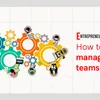YourStory UNCUT: upGrad’s Phalgun Kompalli on the ups and downs of building an edtech unicorn
YourStory UNCUT aims to explore the biggest challenges and failures startups and entrepreneurs have faced in their journeys. This week, Phalgun Kompalli of upGrad talks about the roadblocks he encountered.
“Even today, when we pitch to 10 investors, we hear a ‘No’ from eight,” Phalgun Kompalli, Co-founder of edtech unicorn , tells YourStory.
Founded in 2015 by founder of the UTV Group and RSVP Movies Ronnie Screwvala, Mayank Kumar, and Phalgun, upGrad aimed to cater to the growing needs of upskilling in the market. Believed to be South Asia’s largest online higher edtech company, it currently offers more than 100 courses with tie-ups with top-notch universities. The startup has impacted over two million learners across 100-plus countries.
In August 2021, Mumbai-based upGrad entered the unicorn club after raising $185 million from Temasek, IFC and Indian Infoline Finance. However, all this success was not achieved overnight and the founders continue to struggle with roadblocks that the entrepreneurial journey presents.
“There will always be challenges… It is not like you will only have challenges if you are an angel-funded company, or a Series A company or a unicorn… Even if you are a Tesla or an Amazon, you will have the same number of challenges,” Phalgun says.
For the latest episode in YourStory UNCUT, Phalgun shares the challenges that he, and upGrad at large, faced while building the edtech unicorn.
Hiring and retention
“The number one challenge at every point in the last seven years, and even more right now, is hiring great talent,” reveals Phalgun.
Even with enough capital at its disposal and established brand equity in the market, upGrad struggles with hiring the right talent across its teams. “It is still such a competitive market for hiring talent. The challenge of getting hold of the best talent and getting them to do their best work is always there,” he says.
In the early days of COVID-19, the edtech startup faced a major challenge with respect to keeping the entire team engaged. “Given work-from-home and the difficulties we were facing overall as a group, we saw some level of attrition.”
At present, upGrad is proactively working towards decreasing attrition. To do so, Phalgun reveals that the startup is offering competitive pay, working on its culture to make employees feel entrepreneurial and empowered, and hiring from within the personal network of the existing team.
“People do not mind being told no. What they do mind is being disengaged,” he says. Keeping this in mind, upGrad has been working towards employee engagement.
“We try spreading positivity among our employees by sharing the success stories… This makes employees believe that what they are doing is meaningful and that they are helping make people’s lives better.”
Innovation and growth
Another challenge upGrad faces is in innovating to grow. With startups going through various inflexion points, one gets stuck at one point for months. Post which, figuring out the next innovation to jump to the next point is challenging.
“It all depends on the team, and how fast a startup can innovate and execute… We constantly face these inflexion points,” Phalgun adds.
With the infusion of the last round of funding, upGrad now has a team in Singapore, the UK, and the US, and is currently figuring out how to go about these international markets. “Currently we are at a dis-inflexion point where we are trying to figure out what initiatives we pick and where we need to focus on for the next 20-24 months.”

Major milestones
While getting labelled as a unicorn is a key milestone, Phalgun never mentions it as a highlight of upGrad’s journey. Instead, he listed the following as the major five milestones in the history of the edtech startup.
- Getting the first learner onboarded seven years back
- Partnering with the first university — IIIT Bangalore, and having it as the largest university partner today
- Onboarding the first international university partner — John Moores University, which is now the second-largest university partner for upGrad
- Hiring the first employee and growing the team to 4,000 employees today
- Raising investments
On raising funds
One may think raising funds for a startup founded by an eminent entrepreneur must be a cakewalk. However, that is not the case, suggests Phalgun.
“Having a seasoned entrepreneur is extremely valuable in terms of mistakes that we could have otherwise made and setting the pace and making the right decisions…that guidance and experience are definitely helpful,” he says.
That being said, upGrad does not have a playbook for raising investments.
“I am used to hearing no 50 times a week…from investors, employees, team, university partners, and learners,” he adds, and that he has gotten used to getting rejections.
Phalgun suggests that with the right amount of persistence, entrepreneurs will be able to find investors who understand the value that they bring to the table, understand the mission, and support them in their journey.
“When you are trying to push boundaries and be creative, there will be roadblocks. But do not take it personally when someone says no. It is an opportunity to either understand and learn where they are coming from or to change somebody’s mind and accept that it will not happen overnight,” he says. Phalgun recalls that a university partner that upGrad had approached eight years ago, was only convinced recently, and signed the partnership with the startup.
“Talk to someone who has said no to you. If not money, get constructive feedback from investors who reject you and see how you can improve,” Phalgun advises.

Expert says…
Towards the end of the conversation, Phalgun shares a few suggestions for aspiring and early-stage entrepreneurs. He says:
- “Hire your first employees very carefully, it is a make-it or break-it situation for any company…It will eventually decide if your company grows into a $1 million or $100 million business.”
- “Post the initial phase, you need to realise the value that domain expertise brings to the table…You cannot assume that a general, smart and dedicated person will figure out everything.”
- “Entrepreneurship is not a straight line with a 20-degree slope, it is a sinusoidal curve. So, build emotional and mental resilience.”
When asked one thing that he would like to change about his journey as an entrepreneur, Phalgun ends with, “I would not let various situations affect me as much as I have allowed them to. When something did not go the way I wanted, I would sulk for a long time. What I would do differently is have a little more resilience and take a longer view of life.”
Edited by Saheli Sen Gupta










